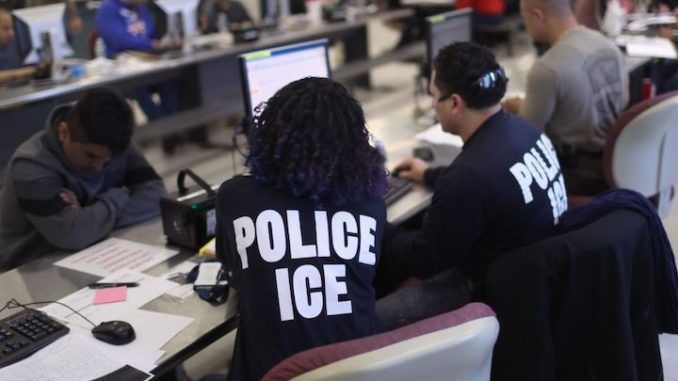
Agents have been told to use “undocumented” or “undocumented individual” instead.
David Shaw, acting assistant director of domestic operations at Homeland Security Investigations, said in a memo that the changes were “an effort to align with current guidance and to ensure consistency in reporting.” His order applies to all official documents, memos and emails.
Washingtontimes.com reports: “Migrant” and “refugee” are still allowed, as is “seasonal worker” and “detainee.” But agents were told not to refer to the crime of sneaking illegal immigrants into the country as “alien smuggling.” The new approved term is “human smuggling.”
And the word “asylee” is gone, in favor of “asylum seeker.”
“These changes should be implemented immediately in all products and correspondence,” Mr. Shaw said in his new memo, which was reviewed by The Washington Times. HSI is the criminal arm of U.S. Immigration and Customs Enforcement.
ICE veterans called the changes stunning and Rosemary Jenks, vice president at NumbersUSA, which advocates for stricter immigration limits, said it suggested misplaced priorities.
“I would think HSI would have more important things to do than this absurd effort to remove legal language from their vocabulary,” she said. “Last I checked, we still have far too many dangerous criminal aliens, sex traffickers, smugglers and other threats to public safety and national security operating in the United States for HSI to be focused on becoming more woke.”
The new directive stands in contrast to federal law, which repeatedly uses the term “alien.” Title 8 of the U.S. code is actually named “Aliens and Nationality.”
It’s not clear how agents are supposed to square their new orders with documents that quote from the law.
ICE’s press office declined to comment on the reasons for the changes, citing a policy against speaking about “internal correspondence or leaked documents.”
Mr. Shaw’s memo didn’t mention what “current guidance” he had in mind when he issued the new rules, though the new White House is clearly not a fan of the old terminology.
Mr. Biden, in his immigration plan last week, proposed changing law to delete references to “alien” and substitute “noncitizen.”
President Trump was a regular user of “alien,” and ICE’s website currently still uses the term throughout its pages.
Deleting that term, and forbidding words like “illegal” from being used in the context of conversations or communications about immigration, have been top goals for immigration activists for years.
They argue that “alien” is dehumanizing, and the word “illegal” is pejorative and unfair to apply to someone who broke the law in order to find a better life here.
Some activists suggest “unauthorized worker” as a substitute, but the most prominent alternative is “undocumented.”
That, however, brings its own problems.
Illegal immigrants usually have documents — though they are often fraudulent or stolen.
Indeed, federal authorities announced charges this month against an illegal immigrant they say purchased a birth certificate and Social Security card belonging to a long-dead person for $1,700. The migrant has been using the false identity for 30 years. He’s also collected Social Security checks under the bogus name, authorities said.
The Library of Congress announced in 2016 that it would change its subject heading of “Illegal aliens” and replace it with “Undocumented immigrants.” The House of Representatives voted to block the change.
News organizations have also debated which terms to use.
In recent years a number of them have adopted the “undocumented” nomenclature.
Some immigration think tanks use the term “unauthorized migrant.”
The Washington Times uses “illegal immigrant” as its standard for referring to those in the country without permission.
Related posts:
Views: 0
 RSS Feed
RSS Feed

















 January 29th, 2021
January 29th, 2021  Awake Goy
Awake Goy 




 Posted in
Posted in  Tags:
Tags: 
















